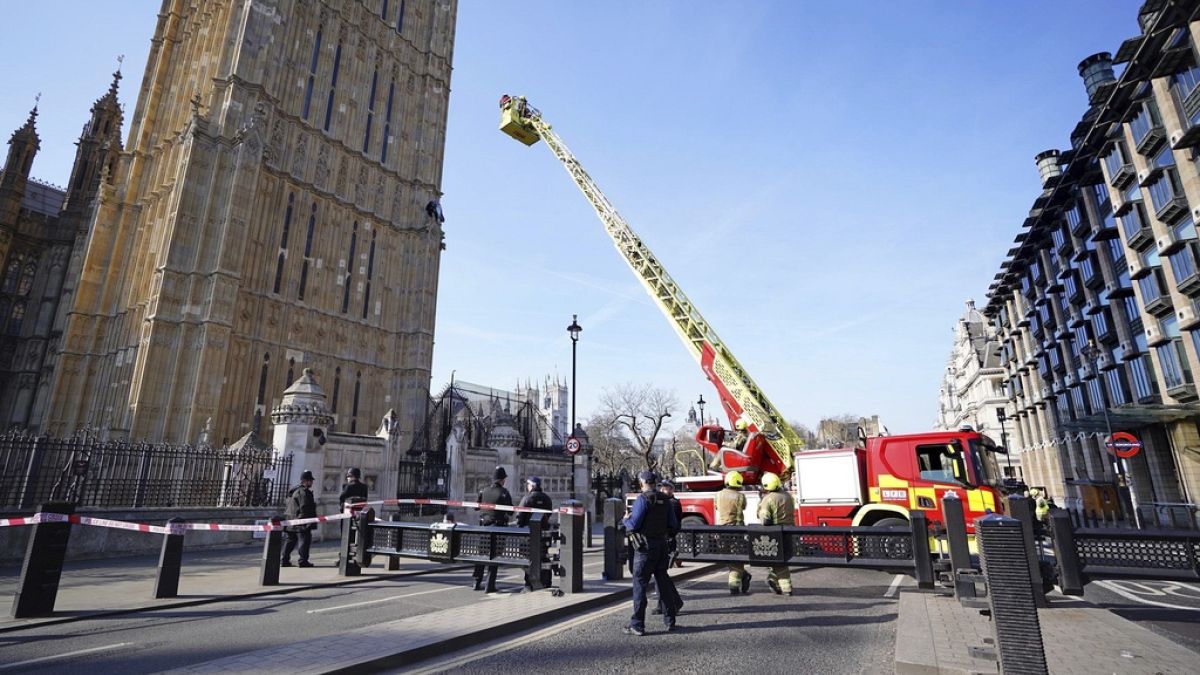Keir Starmer’s biggest enemy: The great-crested newt
Keir Starmer’s environment secretary wants to turn DEFRA into a growth department. That means a fight with the green lobby.
LONDON — Keir Starmer may have seen off the Conservatives — but now he faces a slimier foe: the great-crested newt.
The newly-elected U.K. prime minister has promised to “bulldoze” through red tape and take on the NIMBYs to get Britain building.
His Labour government’s pitching 1.5 million more homes in England over the next five years. Ambitious clean energy plans require vast new solar farms, wind turbines and pylon routes across the U.K.
But shaking up Britain’s planning system means going toe-to-toe with an orange-bellied amphibian with some powerful friends.
The great-crested newt is protected by both EU habitats regulations (rolled over into British law after Brexit) and by the U.K.’s own Wildlife and Countryside Act.
Starmer is not the first politician to try and take the creatures on. “Newt-counting delays” were holding the country back, claimed former Prime Minister Boris Johnson. Newts were on the receiving end of a hostile briefing from one leading financier to Chancellor Rachel Reeves.
The species is often unfairly maligned. The U.K.’s newt-protection process has sped up considerably in recent years, thanks to new technology and simplified paperwork. Yet they remain the warty poster-boys for dozens of species afforded strict legal protections in the country’s planning system.
It is time, Starmer and his ministers believe, for a change. Wildlife campaigners — who have so far stayed onside with the new government — are bracing for a political fight.
Phony war
To help drive through reform, Starmer has installed one of his most trusted allies in the usually low-profile Department for Environment, Food & Rural Affairs (DEFRA).
Environment Secretary Steve Reed has been at Starmer’s side for much of the prime minister’s political career.
A Croydon MP and former council leader of the London borough of Lambeth, he’s not a very rural pick for the rural affairs department. His goal is to ensure DEFRA does not become a blocker on the government’s “build, build, build” agenda — but instead a “growth department,” as Reed himself has put it.
Reed was a leading figure in the Labour Together think tank that propelled Starmer to the Labour leadership. In his days running Lambeth, he fought the hard-left alongside a combative chief of staff called Morgan McSweeney — the man who now does the same job in Starmer’s Downing Street.

Now, a potential dust-up looms with an environmental lobby commanding the support of millions of nature-loving (and newt-loving) Brits.
“The status quo is not working,” Reed and Housing Secretary Angela Rayner said in a letter to green groups weeks after Labour took office.
“Environmental assessments” during building projects, and “case-by-case negotiations of mitigation and compensation” for species, are slowing down “much-needed housing and infrastructure,” they argued.
Future reforms will offer a “win-win for housebuilding and nature,” they claimed. And so far, the government and conservation groups have played nice.
In his Labour Party conference speech last month, Reed went out of his way to reassure greens. “Our legacy will be to give our children back the natural world that is their birthright,” he said.
Richard Benwell, chief executive of the Wildlife and Countryside Link coalition — which has been consulting with the government about their house-building and energy infrastructure plans — said ministers seemed “mindful” of the risks and open to ideas from the sector.
But Benwell had a warning, too. “Done badly, development on the scale the government is hoping for could cause irreparable harm to England’s already-fragile wildlife,” he said.
The dance
For now, there are scant details about how ministers might reform the country’s reams of environmental protections.
Parts of the Green Belt — space around cities protected from development, and making up about 12.6 percent of land in England — will be up for grabs. Ministers have rebranded this “the grey belt” and insist only areas like disused petrol stations and car parks will be built on.
But for many, the Green Belt is sacrosanct. The Campaign to Protect Rural England hails it as “the countryside next door” for millions of urban Brits — and has vowed to “campaign passionately for it to be protected, enhanced, and expanded.”
An even bigger battle may loom over the EU-derived — and newt-protecting — habitats regulations and the so-called Strategic Environmental Assessment (SEA) process, which local authorities use to decide on developments in their area.
“Nutrient neutrality” rules, which govern how developments impact local freshwater habitats, are another potential sticking point. Former Housing Secretary Michael Gove tried to reform them last year, only to be thwarted by Labour, then in opposition, in the House of Lords.

Now campaign groups worry Labour in government might change their tune.
“There will come a moment when the government’s building aspirations will butt up against [nature protection laws],” said one senior green lobbyist, granted anonymity to discuss relations with Whitehall.
“At the moment, there’s this dance between the ministers who are desperate to say: ‘Don’t worry, we’ll work with you and we’ll consult’ — and the sector, who are saying: ‘Don’t worry, we won’t run a campaign.’
“But as soon as they come up against some problem with SEA or habitats regulations, or some unhelpful judicial review, they are going to start looking at the law.”
The flashpoint may come if local communities find a way to block projects essential to the U.K. hitting its net zero goals, the lobbyist predicted. Energy Secretary Ed Miliband has already been warned of potential legal threats from local councils over the impact of energy infrastructure projects, including pylons and solar farms.
Other potential clashes include a new land use framework, due before the end of the year, and a Planning and Infrastructure Bill, which will come before parliament in 2025.
Guards and cakes
Labour MPs appear to be laying the groundwork for big political battles to come. Inside the parliamentary party, a praetorian guard is forming, determined to take on the “blockers”, be they NIMBY or newt.
Even the new chair of the green-inclined Environmental Audit Committee, Toby Perkins, is a member of the new Labour Growth Group caucus.
“I absolutely do believe that the commitment to [building] housing and the commitment to protecting our natural environment and ensuring our farming is sustainable long into the future can go hand-in-hand,” Perkins said.
Josh Simons, another leading MP in the group, agreed, but struck a less conciliatory tone. “When the British public and economy are crying out for builders, there’s no time for blockers,” he said.
Other government figures are hoping to have their cake and eat it.
Ramping up development doesn’t have to harm nature, said Tony Juniper, the chair of Natural England, the government’s official environmental adviser.

The existing approach means “quite technical and quite specific regulatory codes” are protecting “little remnants of rare species, like a great-crested newt population or a little bit of rare grassland,” he told an event this month. Building can even aid nature recovery, Juniper, an advocate for reform, insisted.
“We’ve got to put back [into nature] a lot of what’s gone. If we can link that to infrastructure development and housing that would be a good way to proceed,” he said — although the fact nature recovery is missing from the Starmer government’s core missions “perhaps gives it a slightly lower profile,” Juniper conceded.
Reed and Rayner’s letter insisted Labour will only legislate “if we are confident” new rules back nature recovery.
The Ministry of Housing, Communities and Local Government and DEFRA declined to comment on specific plans for the habitats regulations and SEA. But a government spokesperson tried to play down the idea of a clash.
“For too long, different groups including developers and environmental groups have been pitted against one another,” they said.
“We were elected on a mandate to get Britain building again, alongside protecting and restoring nature, and that is exactly what we will do. We are focused on bringing groups around the table to produce pragmatic solutions that are needed to build the homes and infrastructure this country desperately needs while improving environmental outcomes.”
We need a plan(ner)
Developers, meanwhile, hope officials will look at reforms beyond newts — which not always the bête noire of popular imagination.
“I went in thinking great-crested newts were the thing that would stop us,” said Mark Owen-Lloyd, director of solar company Photovolt’s Botley West development in Oxfordshire. “That’s actually the easy bit,” he added. “You just dip ponds with a stick and it finds their DNA.” It is all much less labor-intensive than the old approach of literally searching them out.
A bigger but more prosaic issue, Owen-Lloyd said, is a shortage of planning experts at local authorities.
“As these [infrastructure] projects increase in number and flow through the process, local authority resourcing will be a major issue,” he said. “Help [from Whitehall] for the local authorities would be a good thing.”
Environmental surveys required under the current planning system mean an “almost guaranteed two year lead-in to application,” he said. “Our bat surveys came up with a barbastelle bat, which is a very rare and threatened bat — so we had to do some extra surveys on that.”
But such environmental protections help reassure local communities, he argued.
“We’re able to absolutely answer [concerns] by showing them our environmental statement,” said Owen-Lloyd. “I think, if you didn’t do that, you’d have a real fight on your hands.”
That fight, as Starmer and Reed are about to find out, is heading straight for Whitehall.
What's Your Reaction?















































